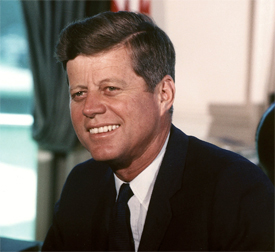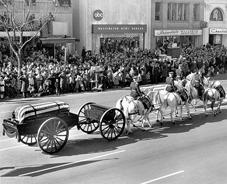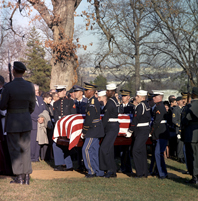 The election of John F. Kennedy as the thirty-fifth President of the United States was a watershed for that country’s Catholics. 50 years after his assassination on 22 November 1963, these edited excerpts from our archive reveal how The Tablet reported the news, the reaction and the aftermath.
The election of John F. Kennedy as the thirty-fifth President of the United States was a watershed for that country’s Catholics. 50 years after his assassination on 22 November 1963, these edited excerpts from our archive reveal how The Tablet reported the news, the reaction and the aftermath.
(All excerpts are taken from The Tablet, 30th November 1963. All photographs are taken from the Catholic News Service)
After the tragedy
To a Washington deep in mourning, bereaved and stunned by a shattering blow, there arrived on Monday a great cohort of the world's rulers, from all the continents, to follow the body of the lost leader to the grave, and to show sympathy with the American people.
President de Gaulle, now in his sixth year of an authority much less trammelled than that of an American President, and announcing that he has formulated no plans for a successor, was prominent among them. But, among the other mourners, the German Chancellor and the British Prime Minister have only come to their preeminent positions in the last few weeks, and the Italians, in the throes of a political crisis, could send neither President nor Premier.
But the assemblage of mourners has been a vivid and eloquent demonstration of the place the United States have come to hold in the world today, so that the murder of their President has been felt everywhere as more than the murder of a foreign chief of state: it is the loss of a statesman who had come to act for the wider community of mankind.
Read more here
A melancholy enquiry
President Johnson had no option but to order, as he has done, the fullest enquiry at the highest level into the whole circumstances of his predecessor's death.
Meanwhile, it must be remembered that, in a country of 160,000,000, it can never be surprising if there are a number whom the psychologists would call maladjusted, and the American people, in their compassion, "crazy mixed-up kids," people whom it is dangerous to trust with firearms in the easy going way in which firearms can be obtained. For twelve dollars through the post a rifle with telescopic sights was bought by a man who, while feeling passionately about public issues, was powerless to do much to forward them.
But, while his positive and constructive power was little, his destructive power was vast. If the business of politicians is with power, power has a fascination which murderers, too, can feel, so that the most insignificant of private citizens can suddenly intervene and hold the attention of the world and change the course of history, if he is prepared to jeopardise his life to do so.
Read more here
National and international echoes
The Dallas police did well to publish the evidence they claim to have against Lee Oswald, evidence that he owned and handled a rifle as well as a pistol, that he was in the building from which the shots were fired, and left it immediately afterwards with a loaded pistol to avoid arrest.
Otherwise there are sure to be dark suspicions in Moscow that the Americans were determined to pin the crime of a Southern White on to a Communist and contrived his death, so that they could declare the case closed; and then a tragedy which should have brought the Russian and American peoples closer together would, in fact, serve to estrange them further.
There is now no Vice-President to succeed if Lyndon Johnson's health should prove unequal to the strain.
Read more here
The world's loss
 President Kennedy lies in Arlington Cemetery, struck down while young in years, but full of honour, the representative of a new generation in American public life inspired by a high seriousness.
President Kennedy lies in Arlington Cemetery, struck down while young in years, but full of honour, the representative of a new generation in American public life inspired by a high seriousness.
His major difficulties and major achievements were on the international scene. The transformation of the United States from an inward-looking society to the most outward-looking of all communities started in the year in which President Kennedy was born, when the Americans found themselves drawn into the First World War, and found themselves unable to withdraw into isolation again.
The late President was the embodiment of the new America which has grown up with, and has fully accepted, a destiny which far-seeing thinkers predicted in the last century, but which only became historical reality under a quarter of a century ago. Really to regard all men as neighbours, really to seek peace with them all, both at home and abroad: this was the great charter under which President Kennedy sailed, and to his fellow Catholics it must be a source of pride that the first Catholic to hold this great office met the challenge of universality as he did, with a response of generosity and commitment which came so logically out of the religion in which he had been born and bred. Requiescat.
Read more here
A new kind of world power
The requirements of American policy and the constitution require the President to justify what he does, and what he asks for from Congress, as being in the national interest, as though the vast armaments and the vast overseas aid were means to a national end.
In a sense it is true, that the peace and well-being of humanity is a national interest of the United States. But that peace and well-being are not means to a narrower end than themselves; they are at once an end and a means; and this has been increasingly through the last quarter of a century the hallmark of American policy.
The United States is a world power in a new and beneficent sense, a country working for the common good. American commercial interests in this or that quarter of the globe may continue to seek their own advantage – they are not the only commercial interests to do so.
It is a wholly novel spectacle, this sustained and world-wide effort of the rich countries with the United States far in the lead. In many of the new countries this help is regarded as a right, and the American people are told that, having wanted to see the end of colonialism, it is their obligation to be foremost in helping the new states to live well.
Read more here
The roots of isolationism
It is an extraordinary destiny for a people who, when they achieved their own independence, intended to have very little to do with the rest of the world but to live in "God's Country," and welcome alike the pioneers and the refugees who had the good sense to join them. Every American's ancestors have come at one time or another from some other country, and have generally been both pioneers and refugees, eager to go forward, anxious to leave some other society firmly and far behind.
They poured into the North American continent, which since the beginning of human life, while it had supported a rich prehistoric creation, had been curiously inhospitable to man, until this immense blood transfusion from Europe has made it teem with human life. But it was until well into this century an inward-looking community, and it has suddenly become the most outward-looking of all communities, save possibly our own maritime and commercial nation, which has made the chief contribution to the American stock.
Read more here
The first Catholic in the White House
The papers have been filled with speculation about President Kennedy's eventual place in history or about the future of American policies. Let us try and consider the position in which President Kennedy has left the American Catholic body.
A few years ago, as [former Governor of New York and 1928 Democratic US Presidential candidate] Al Smith proved, it was of course still impossible for a Catholic to be elected President. There is little doubt that at the last election his religion lost President Kennedy a number of votes and probably lost him important states, such as California, which he would otherwise have carried. The final margin in his favour was narrow. But, whatever the verdict that may be passed on his other policies, in office he manifestly refuted the absurdity that a Catholic in the White House would be a creature of the Vatican, or even that undue favours in patronage or legislation would be given to Catholics.
It is unlikely that there will in fact be another Catholic Presidential candidate for some years to come, but, when such a candidate does in the future present himself, he can— unless there should be some further change of mood— expect to be taken on his merits.
Read more here
Mourning for Kennedy
 The day after President Kennedy was assassinated Pope Paul sent telegrams of condolence to his widow, Mrs Jacqueline Kennedy, to the new President, Mr Lyndon B. Johnson and to the late President's parents, Mr and Mrs Joseph Kennedy.
The day after President Kennedy was assassinated Pope Paul sent telegrams of condolence to his widow, Mrs Jacqueline Kennedy, to the new President, Mr Lyndon B. Johnson and to the late President's parents, Mr and Mrs Joseph Kennedy.
When the Pope heard the news of President Kennedy's death on Friday evening he went immediately to his private chapel to pray for him, and the next day said Mass for him in the same chapel. The same day President Kennedy's name was included among those of cardinals who had died during the year at the annual Requiem for them in St. Peter's.
"We deplore in our heart this event," said Pope Paul in a message broadcast by a US television company. "We express the hope that the death of this great statesman does not bring harm to the American people, but reinforces its moral and civic sense and strengthens its sentiments of nobility and concord.”
Read more here
Towards their going
When Pope John died it was the first, hurriedly arranged and functionally bare Requiem Mass at Westminster Cathedral, crammed to suffocation by those who had flocked to show their grief and their affection, which was clearly the really significant tribute of London's Catholics, rather than the second, more elaborate; celebration.
Precisely the same thing happened with the two Requiems for President Kennedy. On Saturday morning, with [former British Prime Minister] Sir Alec Douglas-Home kneeling recollectedly in the place of honour, between five and six thousand people made their way instinctively to the cathedral as the one place in which they could truly find comfort for their sorrow, and most fittingly offer their prayers for the murdered President.
The prayers and commemorations offered for John Fitzgerald Kennedy have been of many kinds, but all have been remarkable for their note of personal loss. The American Forces base at Ruislip offered a Requiem Mass which had to be relayed to hundreds unable to get in, and both Protestant and Jewish chaplains offered public prayers in the course of it; at Oxford on Wednesday there was a civic Requiem at St. Aloysius at which celebrant, ministers and preacher were all American Jesuits from Campion Hall; and all over the country innumerable parishes, large and small, set aside a special Mass for the man whose death had shocked the whole world.
Read more here
'He Should Have Died Hereafter'
 The shock felt at President Kennedy's death has called to mind a striking passage to be found in the ode which Gruffudd ab yr Ynad Coch wrote on the death of the last prince of an independent Wales, Llywelyn ap Gruffudd, which, in view of the recent recommendation of "official status" for Welsh, we quote in the original:
The shock felt at President Kennedy's death has called to mind a striking passage to be found in the ode which Gruffudd ab yr Ynad Coch wrote on the death of the last prince of an independent Wales, Llywelyn ap Gruffudd, which, in view of the recent recommendation of "official status" for Welsh, we quote in the original:
Ys meu gan deunyd ym divanw a Duw am edewis hebddaw
And which Professor Gwyn Williams has translated as:
I have cause to speak harshly with God who has left me without him.
Read more here


 Loading ...
Loading ...
What do you think?
You can post as a subscriber user ...
User comments (0)